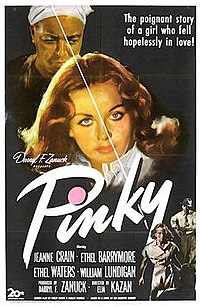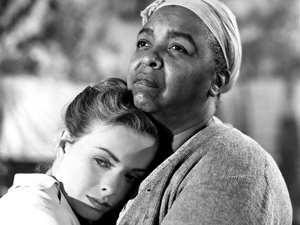Pinky (1949)
Pinky was adapted from the novel Quality by author Cid Ricketts Sumner in 1946. The American drama film was released by Twentieth Century Fox in New York City on September 29, 1949, starring Jeanne Crain, Ethel Barrymore and Ethel Waters. Pinky was directed by Elia Kazan about a light-skinned black nurse who passes for white and planning to marry a white doctor. [1] Based on Rotten Tomatoes, the film had received 54% ratings from 13 reviews. [2]
Plot
Pinky Johnson who was raised by her illiterate laundress grandmother, Dicey, visits her granny in the South for telling that she passed for white throughout nursing school in the North.
During her school as a nurse, Pinky has fallen in love with a white doctor, Dr. Thomas Adams who has no idea about her black ancestor. After telling her situations, Pinky says that she will return to the North, but her grandmother convinced and warned her if the relationships is continued, only trouble will come because of the interracial mariage.
Pinky obeys her grandmother’s advice, instead she stays to help her grandmother taking care of an ill white elderly woman, Miss Em.
Controversy
The term “Passing” in Racial Passing occurs when someone from a certain race is classified and accepted (passes) as a member of one racial group. Historically, the word passing has been used to describe a person of color or multicolor ancestor assimilated to white community to get away from racial discrimination and segregation. [3]
Based on the film, Pinky’s grandmother knows that being a color person at that time was hard and unfortunate, as shown by her advice to Pinky who had been proposed by a young white doctor. She warned pinky to not continue the relationship into next level as it is only caused trouble of the interracial marriage.
Pinky who managed to have a charm life as she pretends to be white, wants to run from her true identity, yet she cannot. Though she is fair skinned, a “pinky”, the slang that was used in that era, her grandmother Dicey sadly is not. Pinky sees how injustice the world can be if someone is colored. She sees the way police harass Dicey’s black friend, but leave her alone as soon as they are aware that Pinky is white. Pinky also barely escapes from a gang rape when two of them realize only black people or women can only live in the town. [4]

